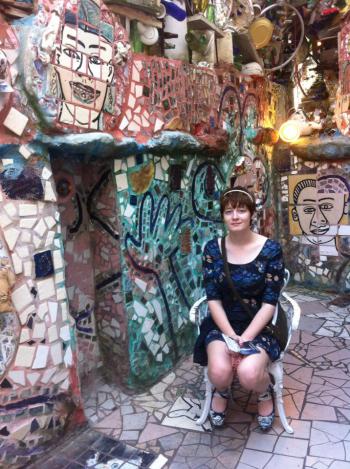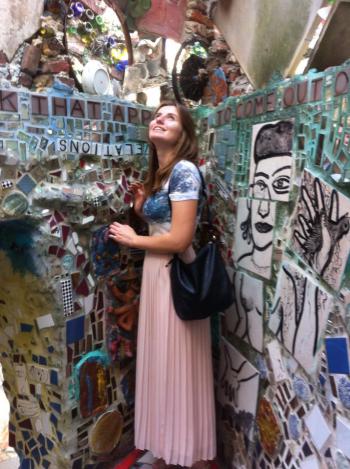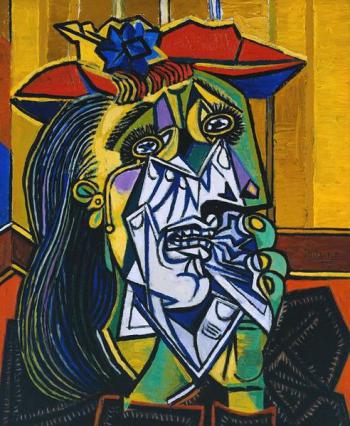Serendip is an independent site partnering with faculty at multiple colleges and universities around the world. Happy exploring!
playcity23's blog

Essay-Rewrite
For this essay-rewrite, Anne basically did all the heavy-lifting in our writing conference. My lens, "How we must be more cautious about blaming," is clear but needs to be used better.
The outline:
Subject- On the Notion of Blame and our Neurology: How Accountable are we for Our Actions?
Thesis: That the human brain is so complex, so much of a mystery to both us and scientists, that we don't know what to make of the chaos and disorder and mystery that goes on inside our own brains, much less other peoples. That is why we go to fiction. To get some sort of order out of the worldly chaos.
Part one: My rant about NW and my expectations for it.
Part two: How Zadie Smith might be trying to recreate all the internal chaos and mystery inside of us. Why doesn't she give us what we seek from fiction?
Part three: Add on/end with the Radiolab piece about blame and the poor man Kevin and his Kluver-Büsey syndrome.

To What Extent Does Your Biology Determine the Direction of Your Life?
 Zadie Smith’s NW mulls over how our neighborhood, clan, and race affects the path your life takes. None of the main characters are satisfied with how their lives turned out, even if in society’s view, their lives turned out rather well. They all feel various degrees of agency to do something about it. While I was reading the book on the Amtrak back to Bryn Mawr, I started thinking about where their biology fits into their predicaments. By biology, I mean how and why their brains are wired. For example, if Leah is wired to have a deficit of agency, is it still her fault?
Zadie Smith’s NW mulls over how our neighborhood, clan, and race affects the path your life takes. None of the main characters are satisfied with how their lives turned out, even if in society’s view, their lives turned out rather well. They all feel various degrees of agency to do something about it. While I was reading the book on the Amtrak back to Bryn Mawr, I started thinking about where their biology fits into their predicaments. By biology, I mean how and why their brains are wired. For example, if Leah is wired to have a deficit of agency, is it still her fault?

To What Extent do We Choose our Own Futures
Anne said in class today that Zadie Smith stated she intended this book to have existentialist facets to it. She wanted it to be a testimony to the agency within us to make something of lives, as well as the lack of it in some individuals (like Leah). I am so curious as to the extent to which we choose our own paths. Because things like biology, societal/cultural pressures, expectations of your family, and where you grew up might have a hand in the direction your path takes. In NW, societal/cultural pressures and the geography of your childhood did play a role in the main character's futures. For instance, Leah slacked off and became a pot-smoking hippie in her days. She didn't work hard and didn't want to work hard. Society viewed her as the pot-smoking hippie she was and expected her life to not amount to much. And it did, according to Leah herself. It did not help, I think, that the poverty of her upbringing layered in her subconscious and made her think that she was destined to stay in this class?

A Rather Bold Mid-Semester Evaluation
I wrote my Common App essay on how I managed to adjust to French teaching styles upon moving to Geneva at nine years old. It was quite the leap for younger Tessa. I have always been rather fascinated at the range of teaching styles I can benefit from. Anne’s style is no exception. It’s very college professor type-y. Exactly how I expected a prof at a respectable school to look and act like. She treats us like the fledgling adults we are, while maintaining a fair level of command. She’s both formidable and heartwarming. Obviously she knows the ins and outs of teaching. She gives the best feedback on my writing that I’ve ever recieved. She is meticulous about structuring each class so we get the most out of the time together. I can feel my writing evolving up into Bryn Mawr’s standard of essays, albeit slowly thanks to this class. That being said, I feel that Anne can be too professor-y on occaision. Her high expectations for us and our writing make it difficult to talk to her less than professionally. This might be why starting conversations in class can be rather awkward. Part of the problem might be that none of us want to be the first one to say something. I can only speak for me, but I find it hard to join in the conversation because I’m afraid what will come out of my mouth will sound stupid to Anne and everyone else. I noticed that Anne asks all the questions and doesn’t volunteer her own relevant experiences or personal thoughts much.

Critical Play is Not Play
All this talk of critical play and plain play reminds me of Anne of Green Gables. I remember reading the book by L.M Montgomery at nine years old and marveling at how Anne was so comfortable with making mistakes and her guardian, Marilla. More importantly, she felt her life had meaning because of her active imagination. I remember she said that “Don’t you ever imagine things differently than what they are? Oh, Marilla, how much you miss.” Anne used her imagination to play in the purest sense of the world: She fashioned all these different lives with her fellow kindred spirit, Diana. She did it for no particular reason other than to keep her wonder for this world alive. She did not play critically, because I think she would’ve said the fun would’ve seeped right out of it. When Flanagan defines critical play as the creation of “play environments and activities that represents one or more questions about aspects of human life,” I strongly believe that critical play is not play at all. I also strongly believe that when you try to inject philosophical questions into your play, it starts to look an awful lot like schoolwork.

My Bread Crumbs
What I took away from The Philadelphia Inquirer:
I thought that the P.I looks like a skinnier, less charasmatic little sister of the New York Times. It does an adequate job (but nothing beyond that) of reporting the news without noticeable bias. It is a bit short on the worldwide news, and leans too much on "shock-value" stories like TWO FACE CHARGES IN HEROIN TRAFFICKING. Other than that, it does well to report local phenomenons that huge newspapers like the NY Times can't do so well.
My Bread Crumb Trail:
1. To Bean or Not to Bean news article about how pretty coffee shops in philadelphia/main line area do.
2. http://www.cbn.com/health/nutrition/reinke_coffeetea.aspx
3. http://www.yelp.com/c/philadelphia/tea
4. http://www.yelp.com/biz/mary-cassatt-tea-room-philadelphia
5. http://www.yelp.com/biz/the-random-tea-room-and-curiosity-shop-philadelphia
Why: I want to try this tea house. I'm an ardent lover of tea and warm drinks (minus coffee. Sorry) and cute pastries. Apparently this place has a dog too. Want to go get a feel for the atmosphere and try their chai. We can work on our essays in there too, or just read a book.

To Play, or not to Play (Critically)
 In Mary Flanagan’s Critical Play, she does an impressive job of painting critical play in a light that implies that it is superior to plain old play. She defines it as “a means to create...play environments and activities that represent one or more questions about aspects of human life.” She states that play is “fun, voluntary, and intrinsically motivated.” I think she implies that plain play does not render useful results. Yet she does grudgingly quote Johan Huizinga where he says “All art derives from play.” When Hanna and I visited the Mosaic Gardens last weekend, this quote could be used to describe Zagar’s whole masterpiece. I understand that critical play is an effective means of creating art, but it is not the best means to enjoy art.
In Mary Flanagan’s Critical Play, she does an impressive job of painting critical play in a light that implies that it is superior to plain old play. She defines it as “a means to create...play environments and activities that represent one or more questions about aspects of human life.” She states that play is “fun, voluntary, and intrinsically motivated.” I think she implies that plain play does not render useful results. Yet she does grudgingly quote Johan Huizinga where he says “All art derives from play.” When Hanna and I visited the Mosaic Gardens last weekend, this quote could be used to describe Zagar’s whole masterpiece. I understand that critical play is an effective means of creating art, but it is not the best means to enjoy art.


Surrealism - The How of Why
 Surrealism and impressionism are my two favorite art movements to date. Whilst on my grad trip to London with my best friend, I saw one of Picasso's Weeping Woman pieces in the flesh (or canvas). Up close, you could feel her sorrow without knowing where her sorrow stems from. I believe this is achieved through the jagged edges and the dichotomy of the black/white portion and the rich color around it. It is both beautiful and emotionally raw.
Surrealism and impressionism are my two favorite art movements to date. Whilst on my grad trip to London with my best friend, I saw one of Picasso's Weeping Woman pieces in the flesh (or canvas). Up close, you could feel her sorrow without knowing where her sorrow stems from. I believe this is achieved through the jagged edges and the dichotomy of the black/white portion and the rich color around it. It is both beautiful and emotionally raw.
Surrealism grew in out of the Dada (or anti-art) movement during World War I. Interestingly, Sigmund Freud helped foster the movement whilst studying patients suffering from shell-shock. André Breton worked with Freud and was fascinated with his dream analysis and the concept of liberating the imagination. In dreams, we unconsciously and randomly mix events, thoughts, voices, etc. that we've seen throughout the day. Our brain tries to make sense of them by making a story out of them. Breton loved this idea, and so did his followers: Juxtaposing things that normally might not have anything to do with each other, and then trying to find a meaning to it.
Breton and his followers created the Surrealist Manifesto in 1924 and the movement took off. It melted into other areas of culture, such as political thought and social theory. While the heyday of surrealism was in the 1930's, the movement is still evolving.

My Mosaic
 Aight. I confess, I did not do this whole thing in one day. I actually started it when I moved in and didn't finish it until this morning. My mosaic is composed of several hundred old photographs, relics of trip past, cards, movie stubs, and everything that I think has a memory of an easier life attached to it. When visiting the mosiacs with Hanna on friday, I was struck again by how different my adult life is now compared to this time last year. It was both thrilling and saddening. When I got home, I added several photos and postcards of the trip to remind me of that feeling. I also added some unconventional things like feathers and business cards, just like Zagar used on bikes and dishes.
Aight. I confess, I did not do this whole thing in one day. I actually started it when I moved in and didn't finish it until this morning. My mosaic is composed of several hundred old photographs, relics of trip past, cards, movie stubs, and everything that I think has a memory of an easier life attached to it. When visiting the mosiacs with Hanna on friday, I was struck again by how different my adult life is now compared to this time last year. It was both thrilling and saddening. When I got home, I added several photos and postcards of the trip to remind me of that feeling. I also added some unconventional things like feathers and business cards, just like Zagar used on bikes and dishes.
I hope you like it.



